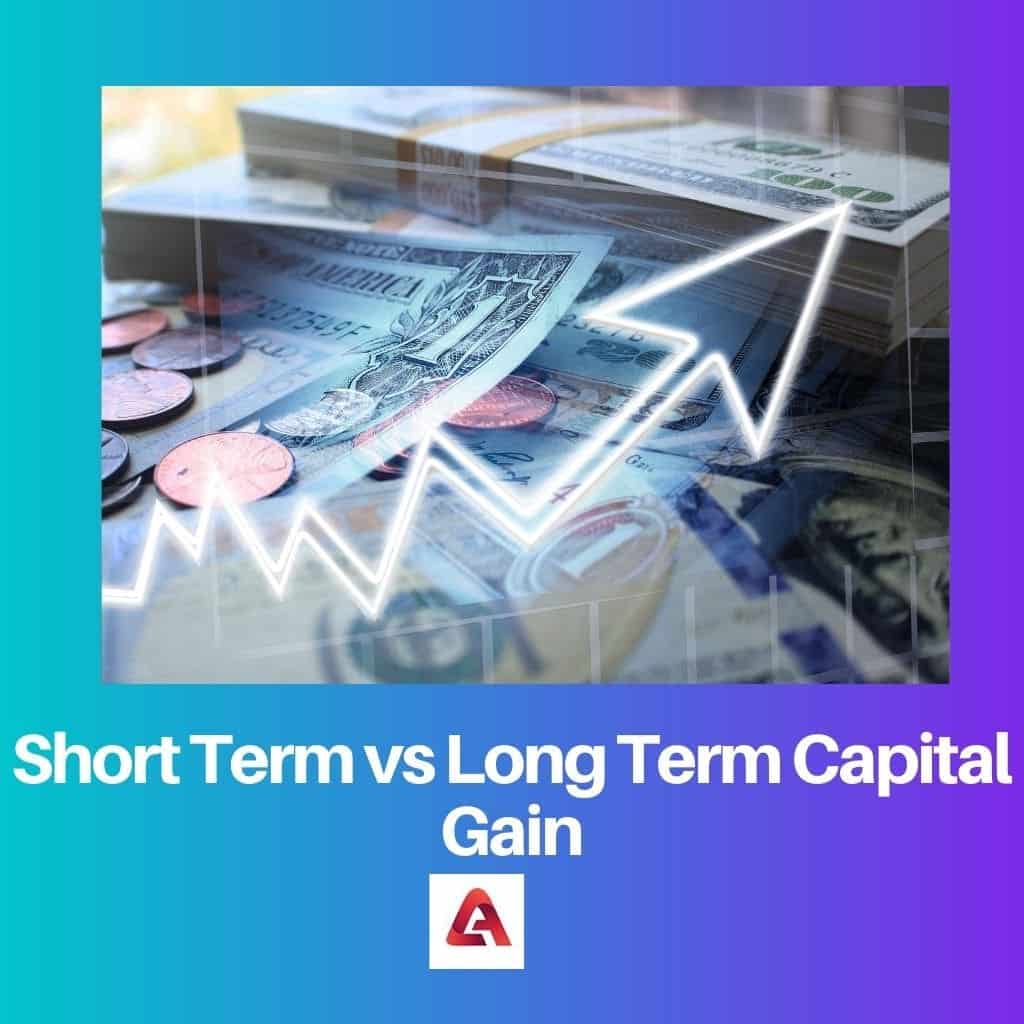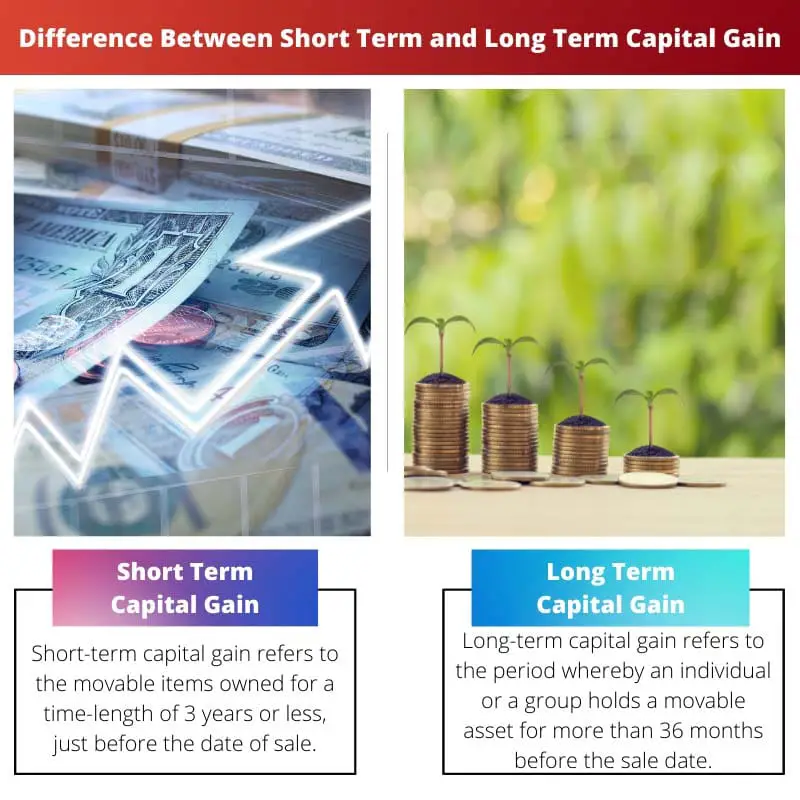Short-term capital gains are profits earned from selling assets held for one year or less, subject to higher tax rates based on the individual’s ordinary income tax bracket. In contrast, long-term capital gains arise from selling assets held for more than one year, taxed at lower rates depending on the taxpayer’s income level, incentivizing long-term investment strategies.
Key Takeaways
- Holding Period Matters:
- The primary distinction between short-term and long-term capital gains is the duration you hold an investment or asset before selling it.
- Short-term capital gains apply to assets held for one year or less, while long-term capital gains apply to assets held for more than one year.
- Tax Treatment Differs:
- Short-term capital gains are subject to higher tax rates, equal to your ordinary income tax rate. This means you may pay a substantial amount of taxes on short-term gains.
- Long-term capital gains receive preferential tax treatment, with lower tax rates. In some cases, long-term gains may even be tax-free for individuals with lower incomes.
- Investment Strategy Implications:
- Investors and taxpayers should consider the tax implications when deciding when to sell an asset. Holding assets for the long term can result in lower tax liabilities and potentially higher after-tax returns.
- Short-term trading and frequent turnover of assets can lead to higher taxes and may not be as tax-efficient as a long-term buy-and-hold strategy.
Short Term vs Long Term Capital Gain
Short-term capital gains apply to assets held for one year or less and are subject to higher tax rates. In comparison, long-term capital gains are profits from assets held for more than one year, enjoying lower tax rates or potential tax exemptions, incentivizing long-term investing.

Examples: 1) Short-term gain: Selling table. 2) Long-term gain: Lending property on rent.
Comparison Table
| Feature | Short-Term Capital Gain | Long-Term Capital Gain |
|---|---|---|
| Holding Period | Less than 1 year (varies by country and asset type) | More than 1 year (varies by country and asset type) |
| Taxation | Taxed at ordinary income tax rate | Generally taxed at a lower rate than ordinary income, or even at 0% depending on income level and specific rules |
| Investment Strategy | Often associated with active trading and short-term market movements | Often associated with buy-and-hold strategies and long-term market growth |
| Risk | Generally considered higher due to potential for significant market fluctuations in the short term | Generally considered lower due to the belief that markets tend to trend upwards over the long term |
| Potential Returns | Potentially higher due to the ability to capitalize on short-term market opportunities | Generally lower than short-term gains, but considered more consistent and reliable |
| Knowledge & Skill Requirement | May require a deeper understanding of technical analysis and market timing | May require more emphasis on fundamental analysis and long-term economic trends |
| Suitability | Suitable for individuals with high risk tolerance, significant time commitment, and active management tendencies | Suitable for individuals seeking a more hands-off approach, willing to accept lower potential returns for lower risk, and have a long-term investment horizon |
What is Short-Term Capital Gain?
Short-term capital gains refer to the profits generated from the sale or exchange of assets that have been held for one year or less. These assets can include stocks, bonds, real estate, and other investments. The duration of ownership is crucial in determining whether a gain is classified as short term.
Taxation
Short-term capital gains are subject to higher tax rates compared to long-term capital gains. The tax rate for short-term capital gains is based on the individual’s ordinary income tax bracket, which can range from 10% to 37% in the United States as of 2022. This means that short-term capital gains are taxed at the same rate as the individual’s regular income.
Impact on Investment Strategy
The higher tax rates on short-term capital gains can significantly impact investment strategies. Investors may need to consider the tax consequences of holding assets for a short duration versus a longer one. Consequently, this might influence decisions regarding the timing of buying and selling investments.

What is Long-Term Capital Gain?
Long-term capital gains refer to the profits derived from the sale or exchange of assets that have been held for more than one year. These assets encompass a wide range of investments such as stocks, bonds, real estate, and mutual funds. The duration of ownership plays a critical role in determining whether a gain qualifies as long term.
Taxation
Long-term capital gains are subject to more favorable tax rates compared to short-term capital gains. In the United States, as of 2022, long-term capital gains tax rates range from 0% to 20%, depending on the taxpayer’s income level. For instance, individuals in lower tax brackets may qualify for a 0% long-term capital gains tax rate, while those in higher brackets may face a maximum rate of 20%. This preferential tax treatment incentivizes long-term investment strategies.
Impact on Investment Strategy
The advantageous tax treatment of long-term capital gains can significantly influence investment strategies. Investors may opt to hold assets for an extended period to qualify for lower tax rates on their gains. This approach aligns with the notion of “buy and hold” investing, where investors focus on long-term growth rather than short-term fluctuations. By strategically timing the sale of assets to qualify for long-term capital gains treatment, investors can potentially optimize their after-tax returns.

Main Differences Between Short-Term and Long-Term Capital Gain
- Duration of Ownership:
- Short-term capital gains result from selling assets held for one year or less.
- Long-term capital gains arise from selling assets held for more than one year.
- Tax Rates:
- Short-term capital gains are taxed at ordinary income tax rates, which can range from 10% to 37%.
- Long-term capital gains are subject to preferential tax rates, ranging from 0% to 20%, depending on the taxpayer’s income level.
- Impact on Investment Strategy:
- Short-term capital gains tax rates may incentivize more frequent trading or shorter holding periods.
- Long-term capital gains tax rates encourage a “buy and hold” strategy, promoting longer-term investment horizons for potentially lower tax liabilities.
- Tax Planning:
- Tax planning for short-term capital gains involves considering the impact of higher tax rates on overall investment returns.
- Tax planning for long-term capital gains focuses on optimizing after-tax returns by strategically timing the sale of assets to qualify for lower tax rates.

Last Updated : 03 March, 2024

Chara Yadav holds MBA in Finance. Her goal is to simplify finance-related topics. She has worked in finance for about 25 years. She has held multiple finance and banking classes for business schools and communities. Read more at her bio page.

This article effectively outlines the tax implications and investment strategy considerations for short-term and long-term capital gains.
Absolutely, the tax efficiency associated with long-term investing is a key takeaway for investors.
While the tax treatment differs for short-term and long-term capital gains, this article effectively highlights the advantages of long-term investing.
Absolutely, the potential tax savings from long-term investing are crucial for maximizing after-tax returns.
The tax implications of short-term and long-term capital gains are crucial to consider when developing an investment strategy. Well articulated in this article.
The tax benefits associated with long-term capital gains are quite compelling. This article emphasizes the advantages of long-term investing.
Indeed, the potential tax exemptions and exclusions for long-term gains can be advantageous for patient investors.
I found the comparison between short-term and long-term capital gains to be eye-opening. It really highlights the benefits of long-term investing.
I appreciate the comprehensive comparison between short-term and long-term capital gains. The tax implications are crucial to consider in investment decisions.
Absolutely, understanding the tax treatment and investment strategy implications is vital for optimizing returns.
This article provides a clear and concise breakdown of short-term and long-term capital gains. It’s well-researched and informative.
Agreed, the examples provided helped me grasp the concepts better.
I found the comparison table particularly helpful in understanding the differences between short-term and long-term capital gains.
The distinction between short-term and long-term capital gains is well-explained. It’s important for investors to consider the tax treatment in their decision-making process.
Absolutely, the tax implications can’t be overlooked when it comes to optimizing investment returns.
The article provides a thorough understanding of the tax implications associated with short-term and long-term capital gains. Well done!
I agree, the investment strategy implications are particularly insightful for investors looking to optimize their tax efficiency.
The comparison table and examples provided a comprehensive understanding of the concepts. It’s helpful for both novice and experienced investors.
Agreed, the real-life examples make it easier to grasp the implications of short-term and long-term capital gains.
I found the tax exemptions and exclusions particularly interesting. Long-term investors can benefit from this insight.
The tax efficiency and investment strategy implications are noteworthy. This article sheds light on the importance of long-term investing.
Definitely, the tax implications can significantly impact one’s investment returns over time.
I found the examples and comparison table to be very helpful in understanding the practical applications of short-term and long-term gains.